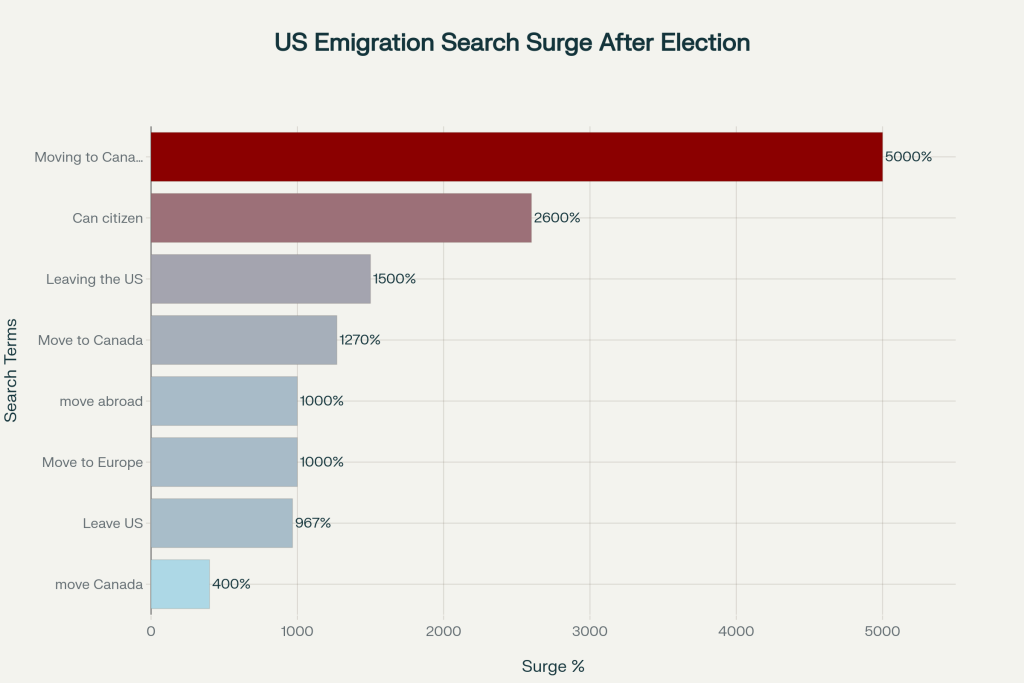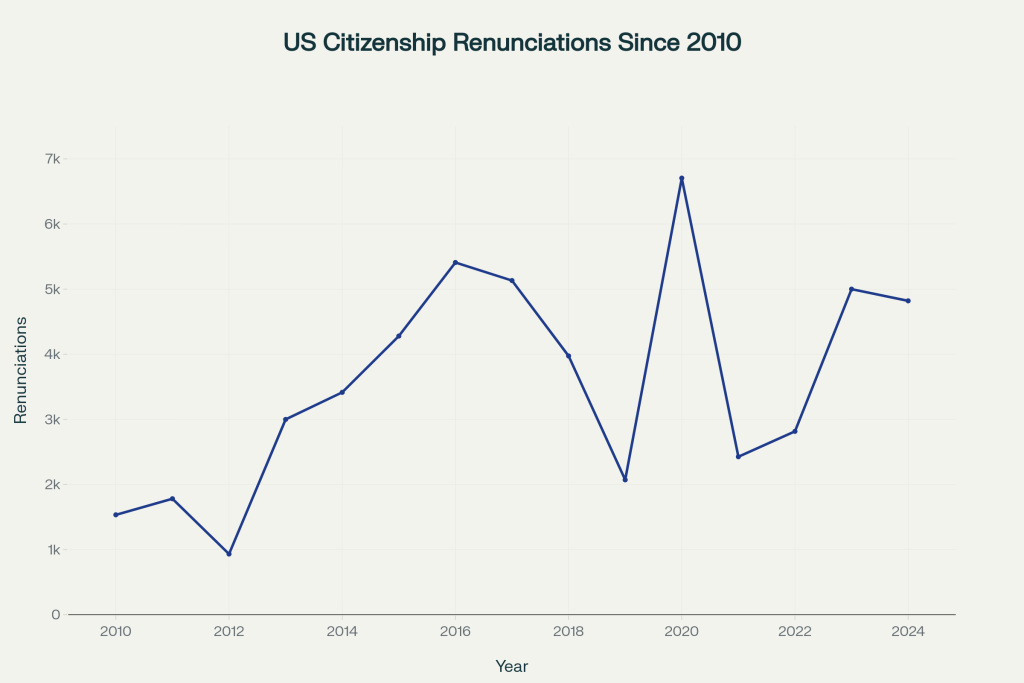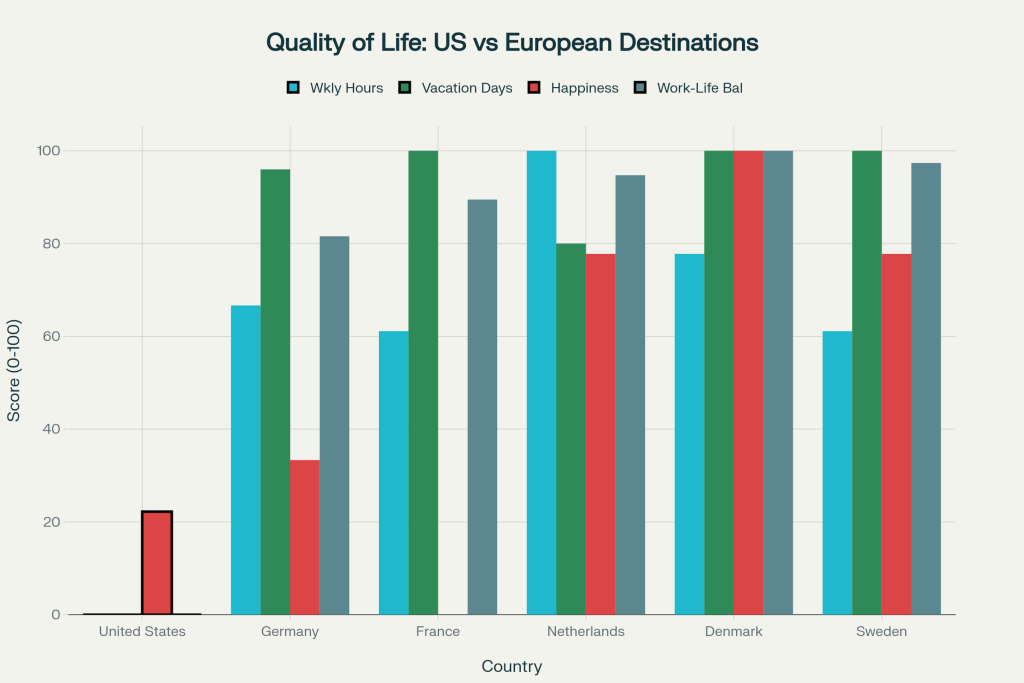The aftermath of the 2024 U.S. presidential election revealed a striking phenomenon: Americans are searching for ways to leave their country at unprecedented rates. Google Trends data shows that searches for “leaving the US” jumped by a staggering 1,500% following the election results, while related queries like “how to move to Canada” increased by 400% on election night alone. This dramatic surge represents more than just post-election frustration—it reflects a deeper, multifaceted crisis of confidence in American life that has been building for years.

The search surge extends far beyond a single election cycle. Terms like “moving to Canada from US” saw increases of over 5,000%, while “Canadian citizenship” searches peaked at levels 2,600% above baseline. These numbers represent real people making real inquiries about fundamentally changing their lives, suggesting that the American Dream—for many—is increasingly being pursued outside America’s borders.
The Data Behind the Exodus: Quantifying American Discontent
Google in Emigration
The 2024 election served as a catalyst for what appears to be years of accumulated frustration with American life. According to comprehensive analysis of Google Trends data, the surge in emigration-related searches was both immediate and sustained. Searches for “how to move to Canada” reached a 12-month peak between November 3-9, 2024, before stabilizing at levels still significantly above historical norms.
The geographic distribution of these searches is particularly telling. The highest search volumes came from states that supported Kamala Harris—Vermont, Oregon, and Washington—suggesting that political alignment played a significant role in emigration interest. However, the breadth of the phenomenon extends beyond partisan politics, with searches originating from across the political spectrum and geographic regions.
Beyond Search Trends: The Reality of American Emigration
While Google searches provide a window into American sentiment, actual emigration data reveals the concrete reality behind the numbers. The most recent data shows that nearly 5,000 Americans formally renounced their U.S. citizenship in 2024, representing a 48% increase from 2023 and marking the third-highest annual total on record. This figure is particularly significant given that citizenship renunciation is an irreversible legal process that requires careful planning and substantial financial resources.

The 2025 Expat Trends Survey, conducted by Greenback Tax Services, found even more dramatic results: 49% of American expats are now seriously considering renouncing their U.S. citizenship, representing a 63% jump from just 30% in 2024. This survey of over 1,100 Americans, including 719 current expats, provides the most comprehensive recent data on American emigration sentiment.
The Multifaceted Crisis: Why Americans Are Looking Abroad
Economic Pressures: The Unaffordable American Dream
The primary driver of emigration interest is economic, with 49% of Americans considering moving abroad citing reduced living costs as a major factor. The economic reality facing Americans has become increasingly stark: inflation rose 3.1% in 2024, with housing costs increasing by 5.7% and transportation costs by 9.4%. For many Americans, particularly younger generations, traditional markers of success—homeownership, financial security, and upward mobility—seem increasingly unattainable.
The Harris Poll’s comprehensive study of over 6,300 Americans found that 68% feel they are merely surviving rather than thriving, a sentiment particularly strong among Millennials, renters, and lower-income families. Perhaps most telling, 68% believe that homeownership has become an unrealistic aspiration for most citizens, indicating a fundamental shift in long-standing economic expectations.
This economic strain is compounded by America’s unique approach to healthcare financing. The United States spends $13,432 per capita on healthcare—nearly twice the $7,393 average of comparable wealthy nations—yet consistently ranks last among high-income countries in health system performance. For Americans looking abroad, countries like Germany, France, and Australia offer universal healthcare systems that provide better outcomes at a fraction of the cost.
Political Polarization and Social Unrest
Political dissatisfaction ranks as the second-most cited reason for considering emigration, with 48% of potential emigrants expressing dissatisfaction with current political leadership. This represents a 6% increase since November 2024, suggesting that the election results have indeed intensified existing frustrations.
The depth of political polarization in America has reached levels that affect daily life. According to recent Pew Research, 65% of U.S. adults say political arguments are a significant source of stress in their lives. This political tension extends beyond Washington, manifesting in workplace conflicts, family divisions, and community fractures that make ordinary social interactions increasingly difficult.
For specific demographic groups, political concerns are even more acute. Among LGBTQIA+ Americans, 67% feel their rights are becoming more vulnerable, with particular concerns among Generation Z (78%) and Black Americans (75%). Similarly, 58% of American women express worries about increasing threats to their rights, particularly among Black women (percentage not specified) and Millennial women (64%).
Safety Concerns and Gun Violence
America’s unique position among developed nations regarding gun violence has become a significant factor in emigration decisions. The United States has a gun homicide rate approximately 15 times higher than other wealthy nations, a statistic that weighs heavily on the minds of American families. For parents, the normalization of active shooter drills in schools represents a particularly stark reminder of this reality.
The psychological toll of living with constant security concerns cannot be understated. As one American expat described to Newsweek, “I feel it’s not normal for children to have to understand that someone could break into their school and try to shoot them”. This sentiment reflects a broader feeling among American parents that their children are growing up in an environment fundamentally different from their own childhood experiences.
Work-Life Balance and Quality of Life
The American approach to work-life balance stands in stark contrast to European norms, contributing significantly to emigration interest. Americans work an average of 1,790 hours annually compared to 1,482 hours for the French, while the United States remains the only developed nation without federally mandated paid vacation time. This disparity in work culture has real consequences: only 34% of Americans report being happy with their work-life balance compared to 51% of Europeans.
The Netherlands exemplifies the alternative many Americans seek, with an average workweek of 29 hours and 20 days of mandated paid vacation. Denmark and Sweden offer similar arrangements, with both countries providing 25 days of paid vacation and significantly shorter work weeks than the American standard.

Demographics of Departure: Who Wants to Leave and Why
Generational Divide
The desire to leave America varies dramatically by age, with younger generations showing significantly higher interest in emigration. According to the Harris Poll data, 63% of Generation Z has considered moving abroad, with 19% seriously contemplating it. Millennials follow closely, with 52% considering emigration and 19% seriously planning it.
This generational divide reflects different life experiences and expectations. Generation Z and Millennials have come of age during periods of economic uncertainty, climate change awareness, and increasing political polarization. They are also the first generations to experience widespread remote work capabilities, making international relocation more feasible than ever before.
The contrast with older generations is stark: only 35% of Generation X and 26% of Baby Boomers have considered moving abroad, with serious consideration dropping to 10% and 6% respectively. This suggests that younger Americans view emigration as a viable solution to systemic problems, while older Americans are more likely to seek domestic solutions or accept current conditions.
Economic and Educational Factors
Higher education and income levels correlate strongly with emigration interest. College-educated Americans show 45% interest in moving abroad, while those with high incomes ($100,000+) register 55% interest. This “brain drain” potential represents a significant concern for America’s long-term competitiveness, as these are precisely the individuals whose skills and resources drive innovation and economic growth.
The economic motivations vary by income level. While lower-income Americans are primarily driven by cost-of-living concerns, higher-income individuals often cite tax optimization, lifestyle upgrades, and access to better public services as primary motivators. The United States’ unique citizenship-based taxation system, which requires Americans to file tax returns regardless of where they live, creates particular challenges for high earners living abroad.
Family Considerations
Parents with children under 18 show the highest interest in emigration, with 71% of expat parents having considered renunciation compared to just 31% of those without children. This dramatic difference reflects parental concerns about school safety, education quality, and the general environment in which their children are growing up.
The concern for children’s safety extends beyond immediate physical threats to encompass broader quality-of-life issues. American parents increasingly view European countries as offering superior education systems, better work-life balance for families, and safer communities where children can develop with less anxiety about violence and social instability.
Popular Destinations: Where Americans Are Headed
European Favorites
Portugal has emerged as the top destination for American emigrants, with the country experiencing a 500% increase in American residents since 2014. The appeal is multifaceted: Portugal offers a Golden Visa program for investors, significantly lower cost of living than the United States, excellent healthcare, and a pleasant Mediterranean climate. The country’s D7 visa also provides a pathway for remote workers and retirees to establish residency.
Spain follows closely, attracting Americans with its own D7 visa program, Mediterranean lifestyle, and affordable living costs. The country’s non-lucrative visa allows financially independent individuals to live in Spain without working, making it popular among retirees and remote workers.
Canada remains the traditional favorite for Americans seeking emigration, particularly given its proximity, cultural similarities, and universal healthcare system. However, recent policy changes under Prime Minister Justin Trudeau have made immigration more challenging, with plans to reduce permanent immigration by 21% in 2025—from 500,000 to 395,000 annually.
The Remote Work Revolution

The rise of remote work has fundamentally changed the economics of international relocation. Countries have responded by creating digital nomad visas specifically designed to attract American professionals. Spain, Croatia, and Estonia now offer programs that make it legal and straightforward for Americans to live and work from abroad while maintaining their U.S.-based employment.
This trend has been quantified in recent migration data: remote workers are 80% more likely to migrate to another state or country than traditional commuters, and one in five remote workers planned to relocate in 2025. The ability to maintain American salaries while living in countries with lower costs of living creates an attractive arbitrage opportunity that many Americans are pursuing.
International Comparisons: What America Is Missing
The appeal of international destinations becomes clear when comparing key quality-of-life metrics between the United States and popular emigration destinations. European countries consistently outperform America across multiple dimensions that matter most to potential emigrants.
Healthcare represents perhaps the starkest contrast. While Americans spend $13,432 per capita on healthcare, Germans spend $7,383, Canadians $6,319, and the French $6,517. Despite this lower spending, all three countries achieve better health outcomes, higher life expectancy, and greater patient satisfaction than the United States.
Work-life balance metrics show similar disparities. The average American works 47 hours per week with zero federally mandated vacation days, while Germans work 35 hours with 24 paid vacation days, and the French work 36 hours with 25 paid vacation days. These differences compound over time, creating fundamentally different lifestyle experiences.
The happiness and life satisfaction data reflect these structural differences. Denmark, Sweden, and the Netherlands consistently rank in the top 10 globally for happiness and life satisfaction, while the United States ranks 19th[comparison_data]. These rankings reflect not just individual contentment but also social cohesion, trust in institutions, and overall quality of life.
The Historical Context: Not Just a Moment, But a Movement
Citizenship Renunciation Trends
The current surge in emigration interest must be understood within the broader historical context of American citizenship renunciation. The trend began accelerating significantly after 2010 with the implementation of the Foreign Account Tax Compliance Act (FATCA), which made it increasingly difficult for Americans living abroad to maintain banking relationships and comply with tax reporting requirements.

The data shows clear peaks during politically significant periods: 2016 (5,409 renunciations during Trump’s first election), 2020 (6,705 renunciations during the COVID pandemic), and 2024 (4,820 renunciations during Trump’s re-election). These spikes suggest that political events serve as catalysts for decisions that have been building over time due to structural issues.
The Broader Expat Population
Current estimates suggest that between 5.5 and 9 million Americans live abroad, depending on the methodology used. The State Department’s higher estimate of 9 million is purposely inflated for emergency planning purposes, while more conservative research-based estimates place the number closer to 5.5 million.
What’s clear is that this population is growing. The American expat community represents a diverse group ranging from retirees seeking affordable healthcare to young professionals taking advantage of remote work opportunities. The growth of this community creates network effects that make emigration easier for subsequent waves of Americans considering similar moves.
The Economic and Social Implications
Brain Drain Concerns
The demographic profile of those considering emigration—young, educated, and financially capable—represents a potential brain drain that could have significant long-term consequences for American competitiveness. When 63% of Generation Z and 52% of Millennials are considering emigration, with college-educated and high-income individuals showing the highest interest, America risks losing precisely the human capital needed for future innovation and economic growth.
This concern is not theoretical. Recent surveys of U.S.-based scientists found that more than 75% are considering leaving the country, citing concerns about funding, academic freedom, and immigration policies that make it difficult to attract international talent. The cumulative effect of such departures could hollow out America’s research and development capabilities.
Network Effects and Acceleration
The growth of American expat communities abroad creates positive feedback loops that accelerate further emigration. As Americans establish themselves in countries like Portugal, Spain, and Germany, they create networks that provide information, support, and social connections for subsequent emigrants. These networks reduce the practical and emotional barriers to international relocation.
Social media amplifies these network effects, with American expat communities actively sharing information about visa requirements, housing markets, and quality-of-life experiences. Platforms like YouTube, Instagram, and TikTok feature countless Americans documenting their emigration experiences, effectively serving as marketing for international relocation.
Policy Responses and Future Implications
Immigration Policy Changes
The surge in American emigration interest has not gone unnoticed by destination countries. While some, like Canada, are reducing immigration quotas due to housing and affordability concerns, others are actively courting American emigrants through specialized visa programs and investment incentives.
Portugal’s Golden Visa program, Spain’s digital nomad visa, and similar programs in other European countries represent strategic efforts to attract American talent and capital. These programs recognize that American emigrants often bring valuable skills, remote work income, and investment capital that can benefit their new home countries.
Domestic Policy Implications
The emigration trend raises important questions about American domestic policy. If significant numbers of educated, productive Americans are choosing to leave rather than work for change from within, it suggests that the country’s challenges may be more structural and difficult to address than previously understood.
The response to this trend will likely become a significant policy issue in coming years. Whether American leaders choose to address the root causes driving emigration interest—healthcare costs, work-life balance, gun violence, political polarization—or to dismiss it as unpatriotic complaining may determine whether the current trend accelerates or subsides.
The Role of Technology and Remote Work
Digital Enablement of Physical Relocation
Technology has fundamentally changed the economics of international relocation. High-speed internet, digital banking, video conferencing, and collaborative software platforms have made it possible for Americans to maintain their careers while living anywhere in the world. This technological infrastructure removes one of the primary historical barriers to emigration: the need to find new employment.
The COVID-19 pandemic accelerated the adoption of remote work technologies and normalized distributed teams. Companies that were forced to operate remotely during the pandemic discovered that many roles could be performed effectively from anywhere, leading to permanent policy changes that enable international remote work.
The New Geography of Work

Remote work has created what economists call “geographic arbitrage”—the ability to earn American salaries while living in countries with lower costs of living. This economic advantage can be substantial: an American software developer earning $100,000 annually can maintain their income while living in Portugal, where the cost of living is roughly 45% lower than major American cities.
This arbitrage opportunity extends beyond cost savings to quality-of-life improvements. American remote workers can access European healthcare systems, benefit from stronger worker protections, and enjoy cultural experiences that would be impossible while maintaining traditional American employment.
Looking Forward: Trends and Predictions
Acceleration Factors
Several trends suggest that American emigration interest may continue to accelerate. Climate change is expected to make certain American regions less habitable while European countries invest heavily in renewable energy and climate adaptation. Political polarization shows no signs of abating, and may intensify ahead of future election cycles.
The demographic trends are particularly significant: Generation Z, which shows the highest emigration interest, is just entering their prime career years. As this generation accumulates the financial resources and professional flexibility needed for international relocation, emigration numbers may increase substantially.
Potential Limitations
However, several factors may limit the actual realization of emigration interest. International relocation remains expensive and complex, requiring significant financial resources and bureaucratic navigation. Visa requirements, language barriers, and cultural adaptation challenges can deter many who express initial interest.
Additionally, economic conditions in destination countries may change. Europe faces its own challenges with aging populations, economic pressures, and political changes that could make American emigration less attractive over time.
Conclusion: A Crisis of Confidence in the American Project
The dramatic surge in Google searches for “leaving USA” represents more than temporary post-election frustration—it reflects a fundamental crisis of confidence in American institutions, systems, and trajectory. When nearly half of American expats are considering renouncing their citizenship, and significant percentages of younger generations view emigration as a viable solution to systemic problems, it suggests that America’s challenges run deeper than any single election cycle.
The data reveals a complex web of factors driving emigration interest: economic pressures that make traditional American success markers unattainable, healthcare costs that dwarf those of peer nations, work-life balance that prioritizes productivity over human flourishing, political polarization that makes civic life increasingly difficult, and safety concerns that force parents to consider their children’s physical security in everyday activities.
Yet this trend also represents an opportunity for American renewal. The same conditions that drive emigration interest could motivate domestic reforms. If American leaders take seriously the concerns expressed by those considering departure—particularly the young, educated, and productive Americans whose skills and energy the country needs most—they might address the structural issues that make emigration attractive.
The choice facing America is clear: address the root causes that make increasing numbers of Americans want to leave, or accept the gradual but significant departure of the human capital that drives innovation, entrepreneurship, and economic growth. The Google Trends data represents not just search interest, but a wake-up call about the direction of American society and the urgency of addressing its fundamental challenges.
The American Dream, it seems, is increasingly being pursued beyond American borders. Whether this represents a temporary crisis or a permanent shift may depend on America’s willingness to confront the uncomfortable truths revealed in the data about why its own citizens are looking elsewhere for the prosperity, security, and quality of life they once expected to find at home.













